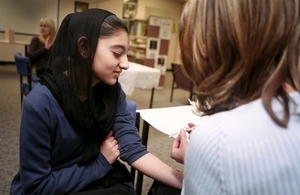Measles cases continue to drop; schoolchildren reminded to get vaccinated
Cases of measles in England continue to fall for the third month in a row, with 73 confirmed cases in July.

MMR vaccination
Cases of measles in England continue to fall, with 73 confirmed cases in July. This is the third successive fall in monthly measles totals (from 116 and 194 cases in June and May) and brings the total number to 1,365 cases since the start of the year.
In April, a nationwide MMR catch-up programme was launched by Public Health England, NHS England and the Department of Health. The programme aimed to prevent measles outbreaks by vaccinating as many unvaccinated and partially vaccinated 10 to 16 year olds as possible ahead of the new school year that starts this week.
Progress in the campaign has been monitored using data on the MMR vaccination status of children between 10 and 16 years old, gathered during July 2013 from around a quarter of general practices in England.
When compared with data for a similar number of children aged 9 to 15 years in 2012, and then extrapolated to all GP practices in England, the numbers suggest that almost 65,000 previously unvaccinated children nationally may have received a dose of MMR vaccine since last year. Additionally, around 2% more children in the 10 to 16 year age group have completed the 2 dose course.
Most vaccines were given in primary care, although in some areas school campaigns were undertaken in response to local measles outbreaks. Vaccine supply figures suggest that around 200,000 extra doses of MMR have been used. Plans are now being developed to further reinforce the programme and increase vaccine uptake in school age children.
Dr Mary Ramsay, Head of Immunisation at Public Health England, said:
We are still making good progress towards the 95% uptake target. We have seen a persistent month-on-month drop in cases, however, it is still too soon to tell if this is of consequence to the campaign.
As children return to school this week it is important to remember that measles is highly infectious and spreads easily in the classroom. Children who are fully vaccinated with MMR help to stop the spread and therefore to protect their friends and families. This is particularly important for those who have health problems such as weakened immune systems who cannot be vaccinated but are at most risk if exposed to the disease.
This serves as a timely reminder for those who have not received a dose of the MMR vaccine to contact their GP urgently. After the second dose individuals achieve almost complete protection.
Professor David Salisbury, Director of Immunisation at the Department of Health, said:
These figures, which show that more children have been immunised and cases are presently going down, are really encouraging. However it is still the case that the best thing that parents can do, if their children have not had two doses of MMR, is to make an appointment with the GP as soon as it is convenient.
The next steps of the programme will be tailored to local needs and will involve sustaining the current high coverage of MMR in younger children, and ensuring that we maximise the routine opportunities for children to catch-up on any missed doses of vaccination during school years.
ends
Notes to editors
-
PHE has commissioned an audit which aims to confirm both the baseline level of coverage and the current level given the catch up programme so far. This audit will take information from the Child Health Information Systems in London and elsewhere, and review this against GP records for those identified as unvaccinated to confirm their vaccination status.
-
The total target population of unvaccinated 10 to 16 year olds is around 300,000. The catch-up programme has a wider ambition to reach partially vaccinated 10 to 16 year olds (around 300,000) and unvaccinated and partially vaccinated children outside this age group (around 300,000).
-
A total of 73 cases were confirmed in England in July, making the total number of cases since the start of the year at 1,365. The South-West region has been the most affected region with 33 cases, some of which were linked to the Glastonbury music festival. The age group most affected in July was age 1 to 4 years (17 of 73, 23%), a change from the 10 to 14 age group affected greatly earlier in the year (last HPR report). The proportion of cases aged 10 to 16 years (12 of 73, 16%) – the age group targeted in the campaign – was similar to that in June which was lower than any month since February 2012.
-
Overall 283 (21%) of all cases in 2013 were admitted to hospital including 39 reported complications including pneumonia, meningitis and gastroenteritis.
-
Among cases this year, 274 cases (20%) associated with secondary school outbreaks. Small outbreaks have also been reported from “hard-to-reach” populations with known low vaccine coverage such as the travelling community and the ultra-Orthodox Jewish community in north London.
-
Public Health England’s mission is to protect and improve the nation’s health and to address inequalities through working with national and local government, the NHS, industry and the voluntary and community sector. PHE is an operationally autonomous executive agency of the Department of Health.
www.gov.uk/phe Follow us on Twitter @PHE_uk
UKHSA press office: National Infection Service
UKHSA press office, infectious diseases
61 Colindale Avenue
London
NW9 5EQ